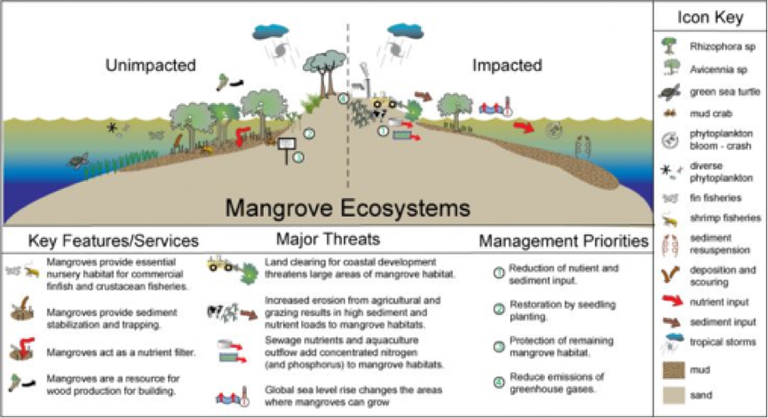An interdisciplinary approach for blue carbon
Why an Interdisciplinary Approach for Blue Carbon?
Blue carbon ecosystems are among the most important, complicated, and complex coastal blue carbon ecosystems can be best understood and managed at a whole ecosystem level that includes oceanographic, geological, chemical, biological, ecological and human processes (see Figure 1 for a mangrove example). Increasing evidence demonstrates that the study of these systems, from both the social and natural science, needs to include all aspects of these systems from carbon, to fisheries, to the human and political context in which these systems reside. For instance, while we have long known that fish and other vertebrates depend on coastal blue carbon ecosystems, a recent paper in Nature (Atwood et al. 2015[1]) shows that many blue carbon ecosystems also depend on vertebrates to support ecosystem function. The role of humans as beneficiaries and stressors in these ecosystems becomes more complex, and critical, when we consider that key vertebrate species may serve important ecological and ecosystem service roles.

Figure 1. Mangrove Ecosystem Services, Threats and Management Priorities
Source: Land Ocean Interactions in the Coastal Zone (LOICZ.ORG, note LOICZ lacks an Africa Regional Node)
The proposal: a multi-national, interdisciplinary Blue Carbon research program
We are currently looking for some seed funding for a three-year project to create a multi-national research team on blue carbon at the LABEXMer. The research team will combine the best of French and International Expertise to provide a holistic approach to understanding the science and management of blue carbon ecosystems, with a focus on francophone countries. Specifically, we seek funds that will allow international researchers to spend at least 2 months/year at the Labex where they will work with the other team members to write proposals to the Global Environmental Facility, World Bank, European Union, and other funding organizations. We expect this team to generate funds that will enable us to hire post-doctoral researchers, to buy additional research time for French and foreign researchers, to hold workshops, and to train students and scientists in francophone countries.
[1] Atwood TB, Connolly RM, Ritchie EG, Lovelock CE, Heithaus MR, Hays GC, Fourqurean JW, Macreadie PI (2015) Predators help protect carbon stocks in blue carbon ecosystems. Nature Climate Change (accepted 17-8-15, on-line 28 Sep 2015).
See also:
